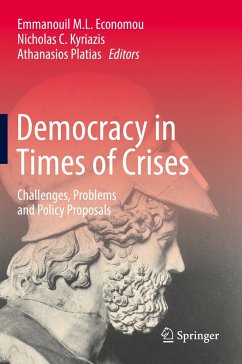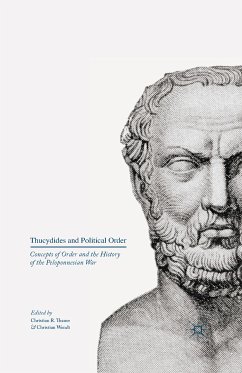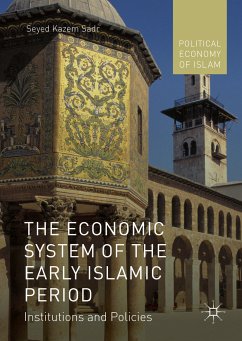
Democracy and Salamis (eBook, PDF)
2500 Years After the Battle That Saved Greece and the Western World
Redaktion: Economou, Emmanouil M. L.; Platias, Athanasios; Kyriazis, Nicholas C.
Versandkostenfrei!
Sofort per Download lieferbar
104,95 €
inkl. MwSt.
Weitere Ausgaben:

PAYBACK Punkte
52 °P sammeln!
In this book, well-renowned international scholars discuss topics related to various aspects of the history of the Battle of Salamis, inspired by the democratic origins of the Greek naval victory at Salamis. They present deductions from the battle that can be useful for today, and seek answers for a more prosperous and brighter future for our societies. Their analyses are divided into five parts in the book: 1) The democratic implications of the Battle of Salamis; 2) The strategies that lead to monumental naval victories; 3) The institutional implications of the Battle of Salamis; 4) Various s...
In this book, well-renowned international scholars discuss topics related to various aspects of the history of the Battle of Salamis, inspired by the democratic origins of the Greek naval victory at Salamis. They present deductions from the battle that can be useful for today, and seek answers for a more prosperous and brighter future for our societies. Their analyses are divided into five parts in the book: 1) The democratic implications of the Battle of Salamis; 2) The strategies that lead to monumental naval victories; 3) The institutional implications of the Battle of Salamis; 4) Various societal aspects of the Athenian democracy; 5) The interconnections between two glorious battles: Thermopylae and Salamis.
This book is the first out of two edited volumes as a sequel of an international academic conference titled Salamis and Democracy: 2500 Years After that took place between October 3rd and October 5th, 2020, on the occasion of the 2500th anniversary of the great historical event of the Battle of Salamis, which saved Greek culture and the newly founded democratic regimes throughout the Hellenic world during the Classical period (508-323 BCE). The book is a must-read for scholars and students of history, political science, economics, and law, as well as policy-makers interested in a better understanding of classical, ancient, and political history, democracy, strategy, governance, and social choice.
This book is the first out of two edited volumes as a sequel of an international academic conference titled Salamis and Democracy: 2500 Years After that took place between October 3rd and October 5th, 2020, on the occasion of the 2500th anniversary of the great historical event of the Battle of Salamis, which saved Greek culture and the newly founded democratic regimes throughout the Hellenic world during the Classical period (508-323 BCE). The book is a must-read for scholars and students of history, political science, economics, and law, as well as policy-makers interested in a better understanding of classical, ancient, and political history, democracy, strategy, governance, and social choice.
Dieser Download kann aus rechtlichen Gründen nur mit Rechnungsadresse in A, B, BG, CY, CZ, D, DK, EW, E, FIN, F, GR, HR, H, IRL, I, LT, L, LR, M, NL, PL, P, R, S, SLO, SK ausgeliefert werden.












